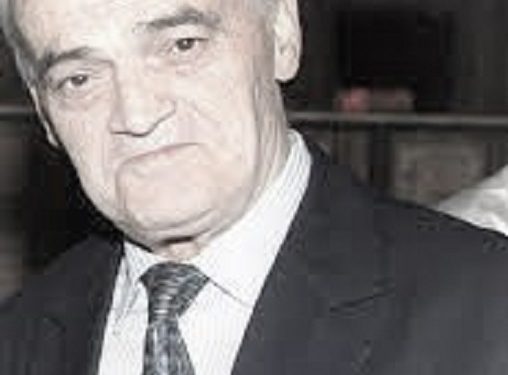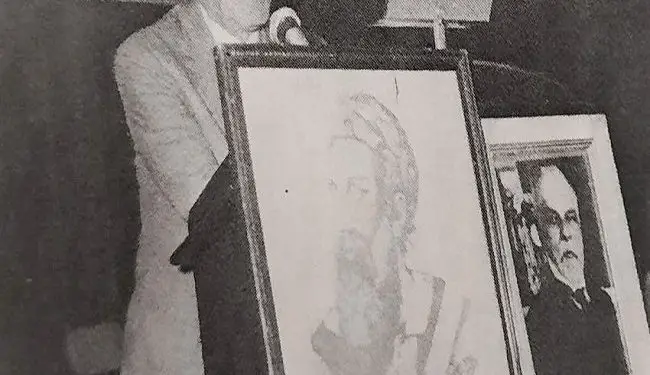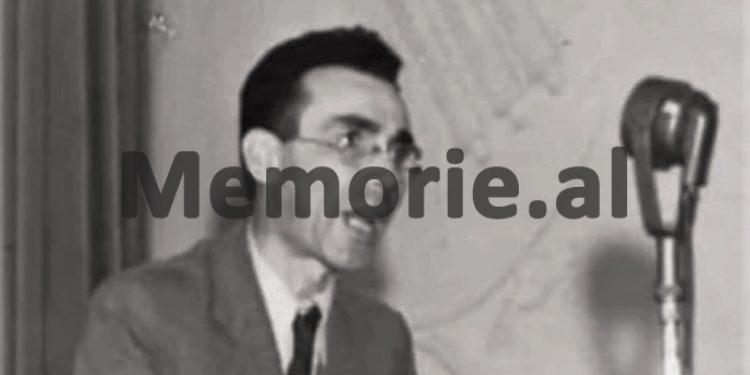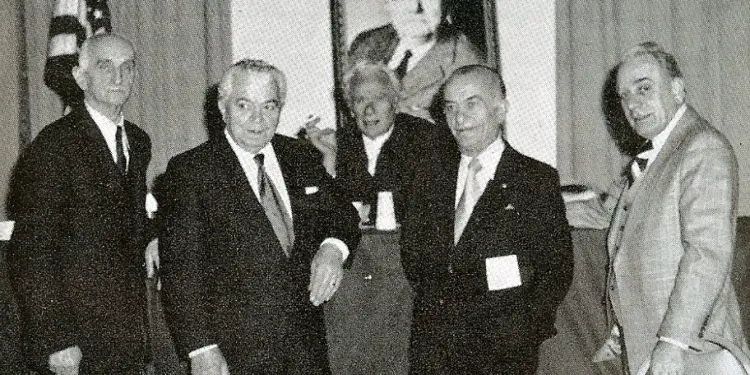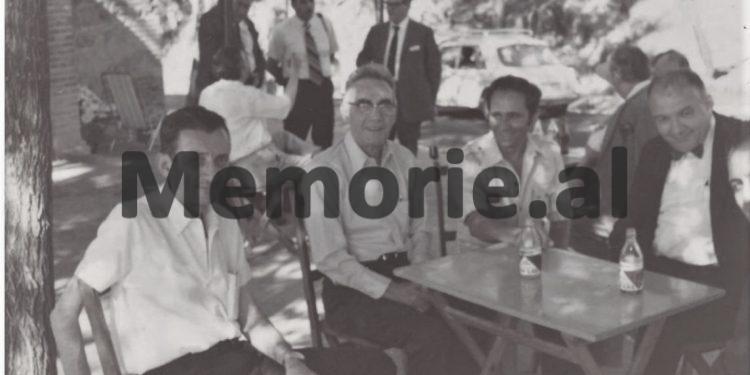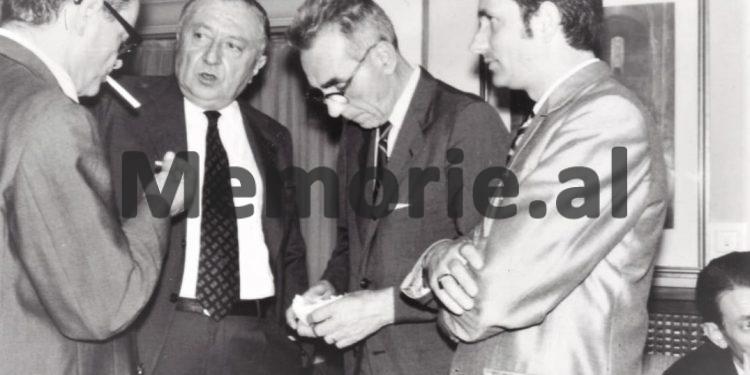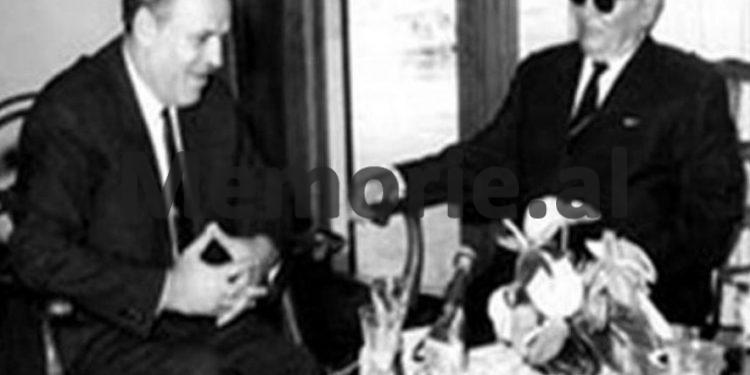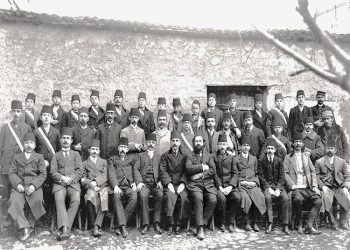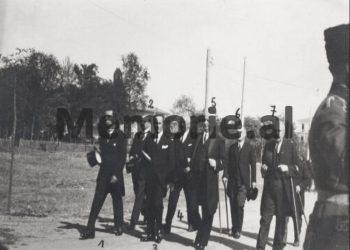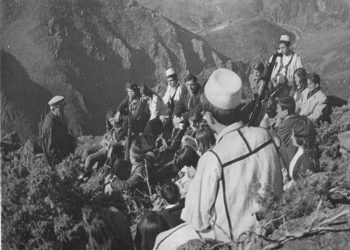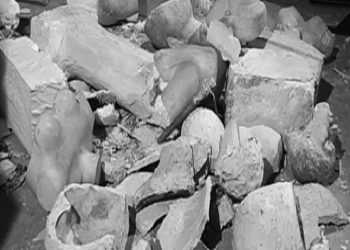By Idriz Lamaj
Part twenty
From the works of the apostles of ethnic Albania
Xhafer Deva
In light of his own letters and other diaspora revelations
Preface
Memorie.al/ Maybe like many others, I often browse letters with my friends and associates, who are no longer in this life. Browsing through them, for a moment unfolds memories that it seems to me that some of them can serve our history. Then, I return to the awareness of the current difficult situation in the ethnic homeland, caused by the quadruple of Albanian politics, I say to myself: “What can my memories of others or the letters of the people of dead? ”
Without being the ominous instigator of pessimism, thinking as always of a better future, I return to my obligations to my friends, and as an icy observer of time, without any claim of historical service, when I am given the opportunity of publication, write what I have in mind, always based on their writings and letters. This principle is also followed in this book about Xhafer Deva. I knew Xhafer Deva in person; we exchanged visits and had a strong correspondence.
I spent days off at his house and inherited all of Xhafer Deva’s correspondence with Rexhep Krasniqi, his closest friend, for more than 40 years. After many years, I talked on the phone with Mrs. Deva’s daughter and son-in-law. In the conversation going on, taking advantage of the old friendship, I asked about his letters and they informed me that it was all Qefali Hamdia, a friend of their family.
In June of last year (2001) I went to Kenosha, Wisconsin, a guest of Qefali Hamdia, to look at Xhafer Deva’s correspondence, which Mrs. Deva sent her years ago, when she, due to her advanced age, was closed his house to go to the house of his 5th daughter and son-in-law, Mrs. Burgl Dagmar and Rev. Dennis Logie.
After reading the bulk of the letters, in the languages I knew, I took with me more than a thousand pages of his correspondence, covering a period of over 30 years, 1945 – 1978. Xhafer Deva spoke and wrote seven – eight languages. His correspondence is: Albanian, English, German, Italian, French, Turkish and Serbian. Xhafer Deva’s letters and writings, with the exception of those in Old Turkish and Serbian in Cyrillic, are mostly typewritten, well-kept, and alphabetically arranged, with the persons he dealt with.
That includes his family letters. He carefully kept a copy of every letter he sent and every letter he received. Mrs. Oswalda Deva, daughter Burgl, son-in-law Dennis Logie and Mr. Qefali Hamdia with family, expressed his heartfelt thanks for the trust they gave me. With special gratitude I recall here the help given to me by my brothers – Captain Nue Gjomarkaj and Nikoll Gjomarkaj, in the preparation of one of the most important chapters of this book.
Kapidan Nou, in addition to making available the subject on Xhafer Deva’s relations with the ‘Independent National Bloc’ and sending paratroopers to Albania and Kosovo, reviewed with me each document of that period, and we formulated the text in the form of a conversation; while Nicholas, deciphered the letters, transcribed and translated from Italian, the unpublished materials to date, which were published in this chapter.
Continues from the last number
Xhafer Deva’s life and activity in exile
– Kosovo in the time of Ethnic Albania –
Xhafer Deva in the light of his own letters
In the United States.
Xhafer Deva’s correspondence with the leaders of the ‘League of Prizren in Exile’.
We open the chapter of Xhafer Deva’s correspondence with the leaders of the ‘League of Prizren in Exile’ with his letter-exchange with Mr. Kalosh Hamdi, one of the most prominent and tragic figures of the “League of Prizren in Exile”. Deva’s correspondence with Kalosh Hamdi occupies a special place and can be called Deva’s most secret correspondence with the leaders of the ‘League’. Deva got in touch with Kalosh Hamdi in 1963. He wrote to him that some close friends were thinking about reorganizing the ‘League of Prizren in Exile’ and that he had not yet decided whether to accept its presidency, which they had proposed to him asking Hamdis, in case the presidency was imposed on him, to engage in his political support.
Deva’s correspondence does not contain Hamdis’s answer, but it seems that he wrote to him because he and his entire circle have been involved in the League of Prizren since the beginning of the reorganization. From their subsequent correspondence, which includes close to a hundred pages, it is understood that Deva and Hamdia have been remembering each other in Kosovo since the middle of 1944. “If you remember, recently, I believe in August 1944. , when we met in the city of Tetova with Xhem Hasen (Xhem Gostivarin-I.L.) and Aqif Recani, sorry, they are both dead, we had lunch at the Hotel “Jadran”, where you advised us about the war and the events taking place in that time and you spent two or three days with us “, writes Hamdia Deva on August 25, 1968, in response to a letter he asked for information, on the conclusion of Aqif Reçani.
“… Not only do I remember you well, but I never forget those few days with you. You were very young then, maybe 17-18 years old. Remember with a rifle in your hand and a round of bullets in your belt, when you brought Aqif to smoke, wrap him in a handkerchief. When we rolled our cigarettes, we all coughed, how strong he had been. The desolate Aqif said: – Kalosh, for God’s sake this tobacco is either moldy or has no partner in the world – and we started laughing “! Many letters shed light on their past. The camel knew Kalosh Hamdi well, and for this reason, kept no secrets from him.
In November 1968, he wrote to Kalosh: Dear Kalosh, First of all I would like to thank him heartily for your generous reception during my stay in Chicago and Kenosha. It is the first time in exile that I have felt at home, surrounded by your family and loved ones that I will always remember. In the ‘curves’, as we say, an expectation like yours has a high price and cannot be equated with money or praise. During the flight, I had plenty of time with the blue once again the aging and decisions we made at Kenosha. I am separated from you and your friends there, with the feeling that I have increased our common faith, that we will be able to make a significant contribution in terms of service to our homeland, conquered by the enemy.
This time I did not have the courage to speak on a plan known only to a friend of mine in New York, who has been prepared, both mentally and in writing, for such a bold move that it can be misinterpreted by hand of a part of our collaborators. I have not expressed this thought, as this thought and plan seeks to strike up with a friend and companion who can understand the importance of such a plan. On the occasion of the New Year, maybe he can make a trip to Kenosha, to personally discuss this plan with you. Please keep this letter to yourself only; although I have not revealed any secret here, I consider this as the first initiative, which I am emphasizing in this letter. This plan is more about “timing” and it seems to me that the time is ripe for such a conversation with you in this field.
Heartfelt greetings, Xhaferi, 2/11/1968.
This secret plan of Deva, which Hamdis later reveals, is not found in the correspondence, but had to do with his efforts to study the political personalities of Kosovo, to interest the American secret circles and to get in touch with them, to form some personal friendship. Deva had long since discovered “an interesting thing” in Washington. Serbian and Croat communists, each for their own national interests, had established personal friendships with various American intelligence figures. Deva had also proposed to his friends Roger and Steve (R. Hollingshead and S. Mc. Gruder) to do their best to recruit Kosovo Albanians in the service of long-term projects for American political strategy in the Balkans.
This plan of Deva is decomposed, from a letter he sent to Rexhep Krasniqi on July 3, 1966, after a visit to Washington: “Our communists in Tirana and Pristina, are either really the most cowards in the world, or its idiots . Serbs, Croats and Bulgarians have set up their own networks of personal friendship here; I learned this from two of my trusted friends. “Our communists are blind and do not think at all about what might happen to our country and to them tomorrow. The Americans are in need.”
Xhafer Deva’s correspondence with Kalosh Hamdi is friendly, family and secret for its time. In their letters it is seen that they made different plans for the future of the ‘League’ and the way to act in the new political conditions of Kosovo and its relations with Albania. They make plans “to build a bridge” between the ‘League’ of Kosovo. created with the merchant class, and possibly with uncompromising intellectuals with the U.D.B. Knowing well his character, seriousness, wisdom, generosity, economic opportunities, and his commitment to serving the national cause, Deva carefully prepared his withdrawal from the political scene and the appointment of Kalosh Hamdis at the head of the ‘League.’ In Deva’s four or five letters the repetitions are noticed, You can keep the Executive Committee of the ‘League’ in harmony better than anyone … “, etc.
Meanwhile, in Hamdis’s letters, the special respect for Deva stands out. He often points out, “The great fortune of the Kosovars we exiled to have you at the helm of their own political activity.” No letter from Hamdis shows his intention to lead the ‘League.’ he encourages Deva to continue running the organization, assuring him that he would sacrifice everything to keep the League afloat until Deva was in charge of it.Kalosh Hamdia killed in July 1973. Kalosh’s assassination He spent two or three weeks in Kenosha near his son, Qefalis, his brothers and his family at the same time he encouraged Qefal to continue his trade business and to follow in his father’s footsteps in the field of national activity.
XHAFER DEVA’S SPEECH ON THE OCCASION OF KALOSH HAMDIS’S BURIAL
Today we are gathered here in front of our honorable and dear husband, father, brother and friend, Kalosh Hamdis, to say goodbye. It is not the first time that we are separated from a warrior, who has overcome many dangers in our mountains while defending freedom for the entire Albanian people. Now he has fallen victim to the bullet of a madman who has become the tool of some still undisclosed betrayal. Extremely rare are the people endowed with the virtues of this distinguished hero, who closed his eyes forever. You have not only an exemplary father, brother and friend, for which he had the admiration and love of his close relatives, as well as those who had the opportunity to know him, but also a wise man with a wide experience and intertwined with a constructive pre-view for the fate of the whole nation.
Although a hero we saw in the bloody wars in the steep mountains of Gostivar, Tetovo, Kichevo and Dibra, Kaloshi has shown his incredible meekness as a caretaker of his immediate family; of his father, mother and sisters, as well as the families of his comrades in the homeland, who, exposed to torture, internment and shooting by the enemy, to discover Kaloshi’s movements, have accepted death but have not have betrayed. Faithful to Albanian traditions even in exile, Kaloshi had ingrained in his soul the desire to help Albanians in need. The door of his house has been open day and night not only for friends, but also for every needy Albanian regardless of religion and province. His interventions with government authorities, the provision of lawyers and employment, as well as financial aid have been on the agenda of this generous spirit.
By intelligent nature, full of energy and dynamism, Kaloshi has always been ready to give his physical and material contribution to any construction company of social and political character. His main concept was: “All those who have troubles are my friends of suffering. I have lived in the mountains for five years. They have given me shelter and shared bread with me. Now it is my turn to be rewarded.” On this day ghastly here we are seeing foreign faces not only from Kenoshe but also from Milwaukee and other places.Everyone has left work and with tears in their eyes, women and men with children, have joined us with the mourning that has befallen us They are civil servants, bank directors, lawyers, doctors, etc. Their presence here reflects the multifaceted values that the late Kaloshi had.The loss of our friend and brother is so painful today that I cannot express it in words the cruel bullet that struck this brother of ours has struck all the long-suffering Albanian nationalism.
Just as history teaches us, it is also confirmed by this victim that: “The greatest enemy of the Albanian is the Albanian himself”. His family loses his incomparable father and brother, while the ‘Prizren League’ loses an irreplaceable leader and fighter. On behalf of the ‘League of Prizren’, at the same time on behalf of the Chairman of the Committee “Free Albania”, Dr. Rexhep Krasniqi, I present the family in the homeland, the generous lady here, the son Oefali and the brothers Rashid, Sakib, Xhavid and Bahri, our deepest condolences. After Kaloshi’s murder, and until a month before his death, Deva maintained close friendships and exchanged visits and letters with Oefali Hamdi. The letters between them, although of a family nature, shed light on many things and are of particular interest on the penetration of Yugoslav espionage into the ranks of the Albanian diaspora, especially that of Kosovo. Qefali Hamdia also showed special care for Mrs. Oswalda, after Deva’s death. He maintained constant contact with her married children, as necessarily with Mrs. and Mr. Logie.
Kalosh Hamdia.
Kalosh Hamdia was born on December 25, 1925 in Recan, Gostivar. He was the fifth brother and had four sisters. He finished primary school in Serbian in Recan. Although intelligent and talented by nature, he did not have the financial means to continue teaching in the Serbian language at the Tetovo Gymnasium. As the eldest of his brothers, with a strong and compact body, from the age of ten, he had to become the right hand of the farmer father. With the capitulation of the Yugoslav Kingdom in 1941, worried that he would have to continue teaching in the Serbian language, Kaloshi, at the head of several peers from Recan and Gostivar, organized the primary school in Recan in the Albanian language, replacing Serbian teachers with younger ones. Albanians who had graduated or were graduating from the Tetovo Gymnasium. Enthusiastic about the quick success of this work, he continued to give his help for the recovery of Albanian education in his province of Tetovo.
Thus he had the opportunity to know the Albanian leadership of those parts, such as: Kadri Salihin, Xhem Gostivari, Dr. Xhaferin, etc. In meetings with them and during meetings especially in Gostivar, Kaloshi showed determination to serve his country. He was charged with numerous tasks related to organizing volunteers for any occasion, especially as World War II was taking a turn to the detriment of his country. With the capitulation of Italy in 1943, and as a result of the appearance of Bulgarian, Serbian, Macedonian and Albanian communist partisans from Albania in 1913, Kaloshi joined the Albanian volunteer forces commanded by the legendary hero Xhem Gostivari.
Operations against the partisans begin and Kaloshi stands out as one of the most prominent fighters in the bloody wars in the mountains of Izvor, Karaosman, Zagorje, etc., as well as against the partisan brigade commanded by Sfetozar Vukmanovic – Tempos. He and his comrades often came to the aid of the Kichevo volunteer forces commanded by Mefail Zajazi. After the partisan occupation of his province, Kaloshi and his comrades stayed in the mountains for a while due to reprisals by the communist government in Belgrade, especially the Bulgarian bloodthirsty, who deported the family and terrorized relatives and his friends.
At the end of 1946, Kaloshi and his friends said goodbye to his province and were forced to cross into Albania. In the mountains of Dibra he joins Dan Kaloshi’s gang. There they clashed frequently with Albanian communist forces and were wounded. Having his life in danger and without any treatment, Kalosh Hamdia surrenders to the Albanian police, presenting a forged ID card with the name Alush Shabani, under the pretext that he was wounded by Yugoslav guards, crossing the border. Thus, he is sent to Tirana Hospital. After recovery he is sent to labor camps in the South. Taking advantage of the softening of the Albanian police’s attitude towards Kosovars and due to the breakdown of relations between Albania and Yugoslavia in 1948, Kaloshi managed to secure a permit to leave the camp and thus was put back in touch with his comrades in the mountains of Dibra. Memorie.al
The next issue follows




